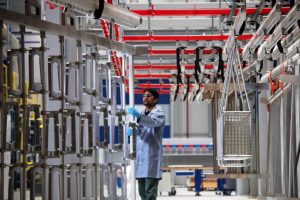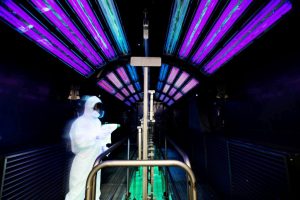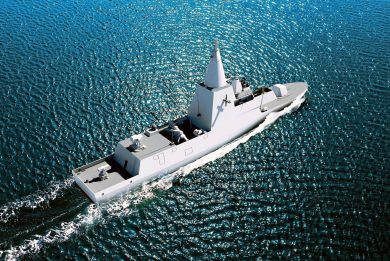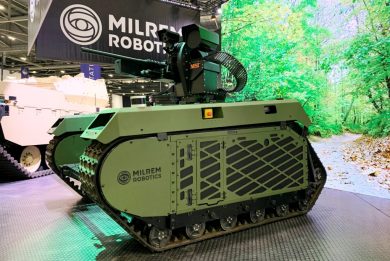
Inside EDGE – EPI: the group precision manufacturing factory
Rarely seen at defence exhibitions, EPI is nonetheless a key element within the EDGE group as it provides precision manufacturing capabilities fully exploited by other entities, although the output towards defence is only a small percent of the company business
Located in the Tawazun Industrial Park, as many other EDGE entities, EPI is a completely vertically integrated company which business is 80% related to commercial airspace, its main customers being Boeing and Airbus, for which it produces flight critical products, 15% of its production being related to Oil and Gas, while only 5% goes to defence companies, mostly part of the group. Currently the export share represents 90% of the total business.
Created in 2007, initially most of its business was related to offsets, coming from contracts signed by the United Arab Emirates with major international companies. “This is not the case anymore,” Michael Deshaies, the company Chief Executive Officer explained, “and now we participate in global campaigns with major OEMs.”

The company is equipped with CNC machinery producing components in soft and hard alloys, is capable t produce aluminium parts up to 4-5 metres, and is also working on titanium elements. Among new tools expected in the near future we find a waterjet cutting machine that will further improve EIP capabilities.
The company is specialised in manufacturing engineering, surface treatments, special processes, and structural assembly, and beside production it has a complete line of metallic and chemical laboratories and quality control facilities. What EPI does not do is designing; the company is producing according to customers’ designs, however its engineers are usually involved at Critical Design Review stage, in order to optimise the design according to production constraints.

The EDGE entities that are regular EPI customers are Lahab, Halcon, ADASI, Al Tariq, although the company also worked for Nimr and Caracal. “We have an ongoing order book for ADASI and we are heavily involved in their UAS programmes, manufacturing bulkheads and parts of landing gears,” Michael Deshaies said. In the past EPI produced elements for the steering assembly of Nimr vehicles, the CEO considering that this might probably be again the case in the future.
A new programme might increase the work in the defence field. “We are currently working with Airbus Defence and Space to produce the prototypes of removable large fuel tanks for the C295 tactical airlifter.” The tank will be 2.5 metres long, 1.5 metres wide and 1 metre high, will be made of around 300 components, and will require 16,000 fasteners to be assembled. “It is the first time that EPI has the responsibility of producing a recognisable subsystem,” the company CEO explains, “and this opens up a new field of activities, where there are less players.”
The C295 cargo space will allow transporting three tanks; these can be used to extend the aircraft range, for example for a ferry flight on a major deployment, to ensure refuelling to other aircraft on the ground, or to provide an air-to-air refuelling capability, coupled with a probe-and-drogue system.
In late February it was possible to see the area that is being prepared for this new programme, which will exploit the OEM accredited supply chain. EPI was awaiting a number of tooling in the following weeks, work on the first of the three tanks being scheduled to start in mid-March. The first two tanks will be used for structural tests, while the third one will be a fully equipped prototype.
Beside new programmes, EPI is also looking at new technologies, additive manufacturing being one of them. Although in the future commercial aircraft will contain more and more composites and plastics, EPI considers that a number of metallic elements will remain, with a possible shift from aluminium to titanium. The company is currently evaluating new techniques, one being near-net titanium building such as Norsk Titanium rapid plasma deposition (RPD). This technology, which is qualified by major commercial aerospace OEMs, allows to considerably decrease the volume of titanium used to produce a component, reducing lead time and cost. EIP is also working on new processes to add fatigue life to its products, the system being still in the approval phase. The company is chrome free, according to ISO 14001. Exploiting the capabilities of the EDGE’s Learning & Innovating Factory, EIP is moving towards Industry 4.0 standards, digital factory floor and Internet of Things.
All this will allow increasing and diversifying products, its defence customer base widening to Boeing, Raytheon, Kaman and Thales, the latter for antennas. The company is expanding its facility; a 6,000 m2 space is being added at one of the extremities of the current facility, while another 3,000 m2 facility is being built at around 1 km distance from the company HQ, the latter hosting assembly lines.
“We are striking for space,” Michael Deshaies told EDR On-Line, “programme such as those for the C295 large tanks needing big surfaces.” Currently EIP has a workforce of around 270 employees, among whom we find manufacturing engineers, process engineers and software experts. “We aim at increasing the number of UAE nationals in the company,” the CEO concluded.
Photos courtesy EDGE


